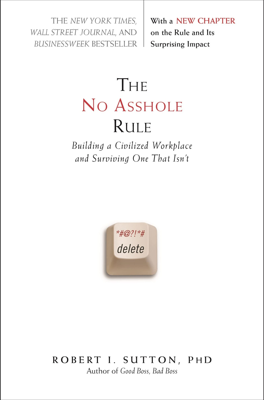Summary
Defining Workplace Assholes
An "asshole" in the workplace is someone who consistently demeans and belittles others, not just someone having a bad day. Robert Sutton identifies them with two tests: the target feels oppressed or humiliated, and the behavior is directed at less powerful individuals. Temporary assholes may have bad moments, but certified assholes exhibit persistent abusive behavior. Common tactics include personal insults and public shaming.
The Damage Done
Mean-spirited individuals cause extensive damage, affecting victims' mental and physical health, reducing job satisfaction and productivity, and increasing turnover rates. Bystanders also suffer from increased stress and fear, leading to reduced productivity and higher turnover. Assholes themselves face consequences like career setbacks and social rejection. For organizations, the presence of toxic employees leads to higher turnover, legal costs, decreased innovation, and reputation damage.
Enforcing the No Asshole Rule
Organizations need to enforce the no asshole rule to protect their work environment. This involves integrating the rule into core policies, hiring practices, and daily behaviors. Effective actions include screening candidates, promptly disciplining toxic behavior, and maintaining consistent positive interactions. Leaders should minimize power differentials and encourage constructive conflict focused on ideas rather than personal attacks.
Managing Your Inner Jerk
Individuals should be aware of their own potential for negative behavior, especially under stress. Managing competitive impulses, seeking self-awareness, and maintaining emotional control can help. Avoid toxic environments, limit exposure to known assholes, and adopt coping strategies like reframing and seeking small wins. Regular self-assessment and feedback are crucial for maintaining a respectful demeanor.
The Downside and Self-Delusion of Assholes
Though some assholes gain short-term power through fear and intimidation, they often suffer from delusions about their effectiveness. Their behavior leads to superficial compliance, growing enemies, and higher associated costs. Assholes may sometimes believe they are successful because of their behavior, but they often succeed despite it. Effective leadership requires kindness and respect.
Key Lessons
Respectful behavior must be actively enforced, with attention to everyday interactions and collective enforcement within the organization. Leveraging public embarrassment and pride can help maintain a positive culture. Self-reflection and avoidance of toxic environments are key to personal conduct. Overall, maintaining a civilized workplace requires everyone’s active involvement and a consistent approach to upholding respectful behavior.
Per-chapter summary
- What Workplace Assholes Do and Why You Know So Many
- The Damage Done: Why Every Workplace Needs the Rule
- How to Implement the Rule, Enforce It, and Keep It Alive
- How to Stop Your “Inner Jerk” From Getting Out
- When Assholes Reign: Tips for Surviving Nasty People and Workplaces
- The Virtues of Assholes
- The No Asshole Rule as a Way of Life
